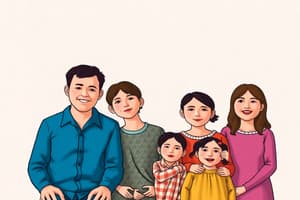Podcast
Questions and Answers
The sociologist Talcott Parsons shaped much of the thinking about the structure and function of the nuclear family in the 1940s.
The sociologist Talcott Parsons shaped much of the thinking about the structure and function of the nuclear family in the 1940s.
True (A)
According to Parsons, the adaptation of the American family to urban areas required an extended family structure.
According to Parsons, the adaptation of the American family to urban areas required an extended family structure.
False (B)
The financial and educative functions of the nuclear family became more dependent on the state in urban areas compared to small towns.
The financial and educative functions of the nuclear family became more dependent on the state in urban areas compared to small towns.
True (A)
Parsons argued that social mobility in America was made possible by strengthening family ties.
Parsons argued that social mobility in America was made possible by strengthening family ties.
Historically, America has always had a tradition of the independent nuclear family since colonial times.
Historically, America has always had a tradition of the independent nuclear family since colonial times.
According to Parsons, the nuclear family is completely isolated from its extended family and kinship network.
According to Parsons, the nuclear family is completely isolated from its extended family and kinship network.
Murdock suggested that the extended family is made up of individual nuclear families related to each other.
Murdock suggested that the extended family is made up of individual nuclear families related to each other.
In cultures with a dominant extended family system, there are no nuclear families.
In cultures with a dominant extended family system, there are no nuclear families.
After the death of the patriarch in an extended family, a new cycle begins with multiple nuclear families.
After the death of the patriarch in an extended family, a new cycle begins with multiple nuclear families.
The nuclear family structure remains constant throughout generations in cultures with dominant extended family systems.
The nuclear family structure remains constant throughout generations in cultures with dominant extended family systems.
Flashcards are hidden until you start studying
Study Notes
Nuclear Family vs Extended Family
- The nuclear family is a unit of residence and consumption, with financial and educational functions dependent on the state.
- The nuclear family is not isolated from its kin, but has networks with grandparents, brothers, sisters, and other kin.
- The key to studying family structure and its relation to function is the nuclear family.
Talcott Parsons' Theory
- Parsons theorized that the adaptation of the American family from an extended family system in agricultural areas to urban areas required a nuclear family structure.
- The nuclear family became isolated geographically and psychologically from its kin, with its major remaining function being to provide for the psychological aspects of the family, such as socialization of children.
- Parsons argued that social mobility in America was made possible by the breaking of family ties, but at the cost of psychological isolation.
Critique of Parsons' Theory
- Studies of social networks in North America and Northern Europe have shown that the nuclear family is not isolated from its kin, and is not independent to the degree assumed by Parsons.
- Nuclear families have networks with grandparents, brothers, sisters, and other kin, even in industrial countries.
Murdock's Distinction
- Murdock made a distinction between the nuclear family and the extended family, stating that the extended family represents a constellation of nuclear families.
- The extended family is essentially a constellation of nuclear families across at least three generations.
Cycles of Family
- In countries with an extended family system, not all families are extended in structure and function.
- The three-generation extended family has a lifetime of perhaps 20 or 30 years.
- After the death of the patriarch, one cycle closes, and a new cycle begins with the two or three nuclear families of the married and unmarried sons and daughters.
- These nuclear families are in transition, and some may form new extended families, while others may not have children or marry.
Studying That Suits You
Use AI to generate personalized quizzes and flashcards to suit your learning preferences.



